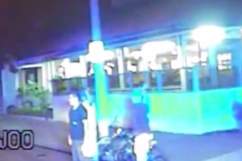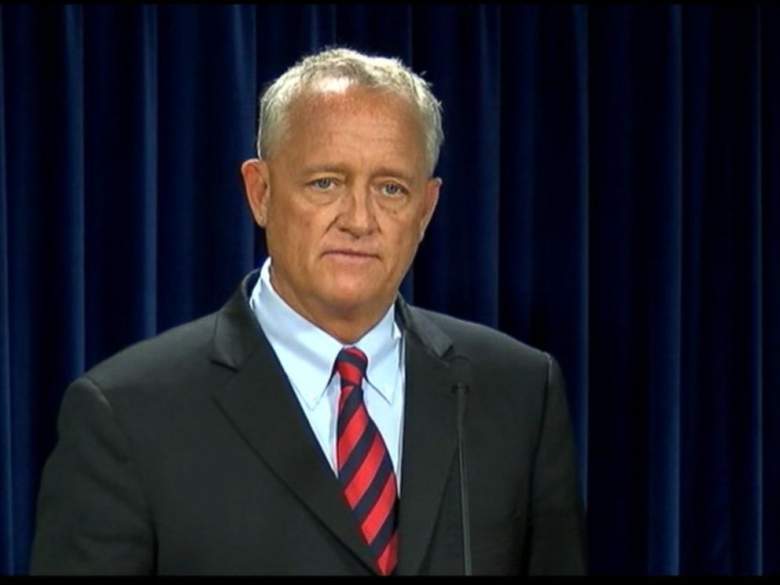
Hamilton County Prosecutor Joe Deters appears in a June 29th press conference announcing the indictment of former UC Police Officer Ray Tensing. (Screen grab from released video)
On July 29, Hamilton County, Ohio Prosecutor Joe Deters made history by becoming the first prosecutor to charge a Cincinnati police officer with committing murder while on duty. During a highly emotional press conference, Deters called the July 19th traffic stop of Samuel Dubose by former University of Cincinnati Police Officer Ray Tensing one of the most asinine acts he ever saw a police officer take and a “chicken crap” stop.
Tensing, who pulled over Dubose for failure to display a front license plate off of university grounds, was shown on his body cam video shooting Dubose while Dubose was attempting to unfasten his seatbelt. The body cam video directly contradict Tensing’s previous account of the video, in which he said that he shot Dubose after Dubose attempted to pull off. Tensing alleged that he was knock down and received injuries from the stop, which was refuted by the video evidence.
The indictment means that Tensing is facing life imprisonment if found guilty. The killing of Dubose — who is black — by a white officer has reignited racial tensions surrounding the string of police-related killings of unarmed black men. Tensing, who was previously condemned for his handling of this case and his refusal to release the body cam video early, has joined the small club of prosecutors that have opted to prosecute a case of police brutality — despite the extreme challenge of proving murderous intent beyond a shadow of doubt.
“It was senseless. He lost his temper because Mr. Dubose wouldn’t get out of his car quick enough,” Deters said. “When you see this, you won’t believe how quickly he pulls his gun. Maybe a second — it’s incredible.”
“This office has probably reviewed upwards of 100 police shootings and this is the first time where we thought, ‘This is without question a murder. I’ve been doing this for 30 years. This is the most asinine act I’ve ever seen a police officer make, totally unwarranted.”
This is what you need to know:
1. Deters Was Successfully Written Into Office
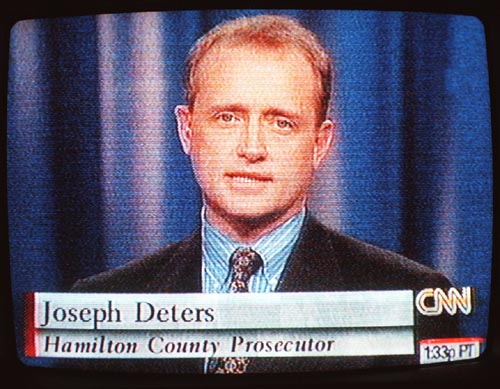
Hamilton County Prosecutor Joe Deters appears on CNN’s Burden of Proof in 1998. (Screen grab)
In Fall of 2004, Deters became a write-in candidate for Hamilton County Prosecutor. Formerly the county prosecutor from 1992 to 1999, Deters was sworn in as Ohio State Treasurer in 1999. He is credited with bringing in an all-time record for investment earnings for the state’s portfolio in 2001 and instituting major reforms toward making the Treasurer’s Office more technologically and fiscally efficient. However, repeated scandals helped to tarnish Deters’ political prospects in Columbus.
Deters — who, at one time, served as the head of the Hamilton County Republican Party — won the 2005 election with nearly 60 percent of the vote.
2. Deters Was Against Xavier University’s Investigation Into the Sexual Abuse Allegation

Dezmine Wells as he appears in his Terrapin profile. Joe Deters famously condemned Xavier University’s investigation of Wells, leading to no charges being filed against Wells for sexual assault. (University of Maryland)
In 2012, Dezmine “Dez” Wells was expelled from Xavier University on allegations that he committed sexual assault on a female student. After the grand jury rejected the referral to prosecute Wells, Deters took umbrage in what he saw was a rush to justice by Xavier, calling Wells’ expulsion conviction “fundamentally unfair” and “seriously flawed.” Deters stated that the case “should never have gotten to the point where someone’s reputation is ruined.”
The allegation derailed Wells, who was an Atlantic-10 all-rookie small forward with Xavier. “I cannot by law discuss what went in front of the Grand Jury,” Deters told WLW, as quoted by the Sporting News. “What I can tell you, though, is this is a young man with no record that we know of, who this allegation was leveled against and in our opinion at the conclusion of this that the Grand Jury did come to the right conclusion.”
Deters argued that the university’s “casual” treatment of the case, including having Wells and his accuser be positioned before a panel of Xavier students and faculty without representation belittled the seriousness of the allegations and exposed both parties to significant harm. “This offense carries mandatory prison time. This is not shoplifting,” Deters said. “If found guilty, this individual faced 11 years in prison. This is no laughing matter. And people are reviewing it who, I would suggest to you, haven’t been doing it for decades.”
According to the civil lawsuit filed by Wells, Xavier University failed in several significant ways. First, the university inappropriately placed the burden of proving that the sex with the accuser was consensual on Wells. Second, the university relied on students and staff untrained in how to evaluate a sexual assault case. Third, the panel was not informed that a medical examination found no sign of sexual assault and finally, the accuser was allowed to call character witnesses, but Wells was not.
Without admitting fault, Xavier would settle with Wells for an undisclosed amount. Wells would transfer to the University of Maryland, where the allegations followed him. To date, no one was charged with the sexual assault alleged to Wells.
3. Deters Is in Favor of Marijuana Legalization
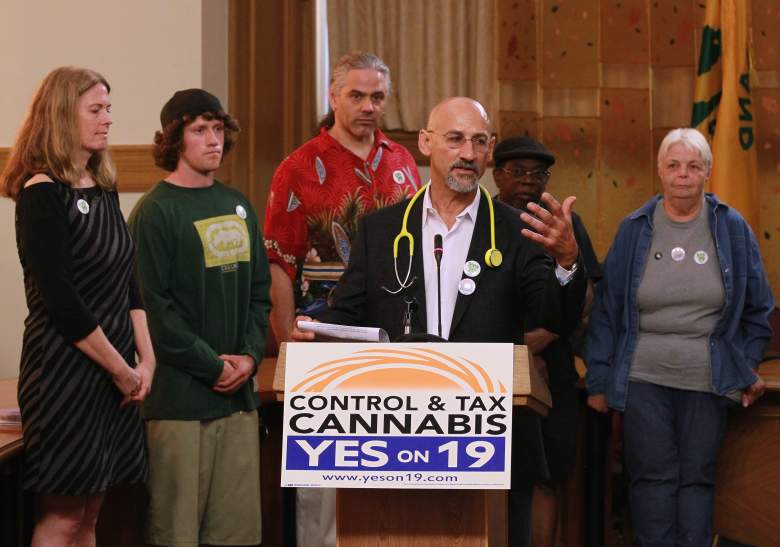
Surrounded by medical marijuana patients, medical marijuana activist Dr. Frank Lucido (3R) speaks during a news conference to bring attention to California State Proposition 19, a measure to legalize marijuana in California on October 12, 2010 in Oakland, California. (Getty Images)
In May, Deters — a law-and-order Republican — made news by stating that Ohio’s existing marihuana laws are “useless.” Stating that enforcing them is a “major waste of resources for law enforcement,” Deters announced his support for marijuana legalization.
Arguing that criminalization of marijuana empowers criminal elements and unfairly targets African-Americans, Deters has sponsored a task force to work with ResponsibleOhio — who seeks backing a legalization constitutional issue for the Fall ballot — to do a full study of the impacts of legalization. Although he acknowledged the changes the task force recommended, he stopped short of endorsing them. His statement on legalization reflects long-held views Deters has had regarding the futility of marijuana criminalization.
“You can walk out of your office right now and buy some marijuana in 10 minutes and the money is going to bad guys instead of local schools and government funds,” Deters said to the Columbus Dispatch. Deters acknowledge that issues such as minimizing the potential of impaired drivers using marijuana must be addressed prior to legalization, but the boon to the state’s tax coffers and to public safety makes legalization an issue worth talking about.
This position places deters at odds with most of the state’s Republican leadership, including Gov. John Kasich.
4. Deters Took Tensing’s Case Personally & Will Prosecute the Case Himself
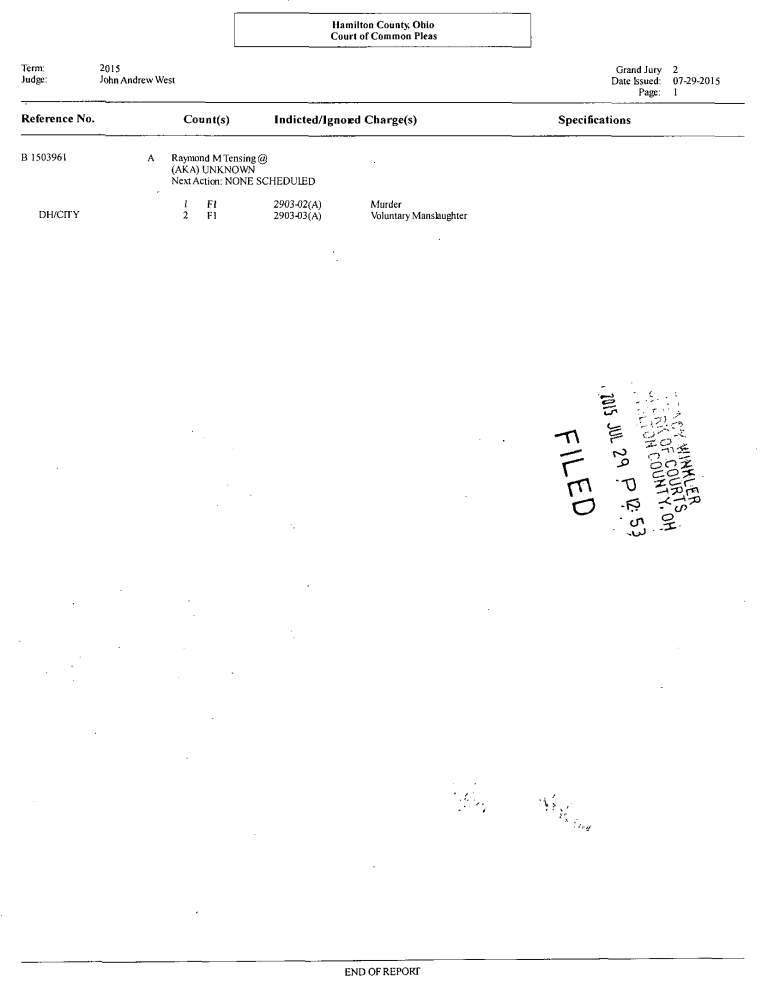
Copy of Ray Tensing’s indictment. The indictment shows that Tensing was indicted for both voluntary manslaughter and murder. (Hamilton County Clerk of Courts)
Saying that Tensing “never should have been a police officer,” Deters is taking the unusual step of heading Tensing’s prosecution himself, according to the Cincinnati Enquirer. Deters’ passion-filled press conference — where he called Tensing a murderer, alleged that the stop was “chicken-crap” and called the entire episode “senseless” — left few familiar with Deters’ career surprised about his decision to personally prosecute.
“Joe’s very outspoken about what he believes and what he feels about cases,” said Cincinnati-based defense attorney Kelly Johnson about Deters’ demeanor during the press conference. “That would not be unusual for Joe.”
This will be Deters’ first police abuse case that involved a murder. Deters rarely prosecute cases himself, but do get involved for high-profile cases, such as the trial of serial killer Anthony Kirkland.
5. Deters Has Been Accused of Ethics Violations
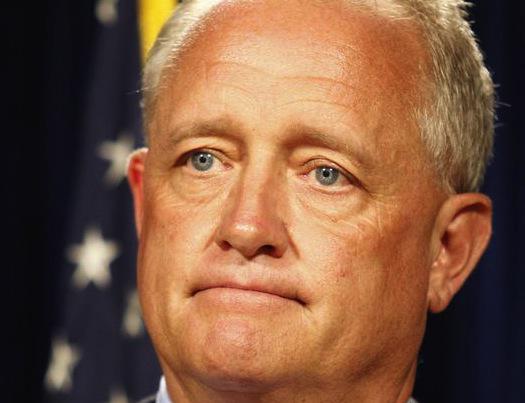
Joe Deters at a press conference following his decision not to seek a hate crime prosecution following the July 4 Government Square attack of a white man by a group of black men. Deters argued that there was no proof that the victim, Christopher McKnight, was attacked just because he was white. Deters, however, did call the suspects “soulless” and “unsalvageable” publicly. (Screen grab from released video)
Despite the good will his prosecution of the Tensing case will likely bring, questions of Deters’ professional ethics continue to hound him. In 2000, for example, the Cincinnati Enquirer found that the Ohio Supreme Court has criticized the Hamilton County Prosecutor Office for making improper courtroom statements to secure 14 death penalty cases from 1988 to 2000. These statements — meant to solicit an emotional response from juries or to paint the defense in a poor light — is frown upon during capital offense cases, where facts are meant to be the exclusive determining factor in guilt.
Deters’ ethics were further tested when, in 2004, Matt Borges, a former chief of staff and fundraiser for Deter, plead guilty in a “pay-to-play” scandal. Borges gave 10 brokers that contributed to Deters’ campaign fund preferential treatment in securing state Treasurer’s Office contracts. Borges’ conviction was joined by a guilty plea by Eric Sagun, who also raised money for Deters. Sagun solicited $50,000 from convicted Cleveland-area broker Frank Gruttadauria in 2001 with the understanding the funds will make it to Deters’ campaign fund.
While Deters was not convicted in regards to any of these scandals, they continue to cast a dark shadow against his reputation. One situation in which his ethics are being called into question is the retrial of suspended Hamilton County Juvenile Court Judge Tracie Hunter on the dismissed charge of misusing a county credit card. Many in Cincinnati’s black community allege that Deters has a personal vendetta against Hunter, who was convicted in 2014 on a single count of misusing her authority as a judge to provide documentation to her brother before a disciplinary hearing.
Evidence of Deters’ personal influence in this case can be pointed to the appointment of Special Prosecutors R. Scott Croswell and Merlyn Shiverdecker, who previously defended Deters during his tenure as treasurer on allegations of missing monies from the evidence room of the Treasurer’s Office. Croswell and Shiverdecker are partners in Croswell Adams, which represented Deters in his divorce.
It is believed that Deters is retaliating against her for filing complaints against him with the Ohio Supreme Court and for pushing back against Deters and his assistant prosecutors in Juvenile Court. “The Hamilton County Prosecutor’s office runs this county. We all know that,” said Clyde Bennett, Hunter’s attorney.”Who files a complaint against the mighty prosecutor here? Nobody. Now, she’s paying for it.”

